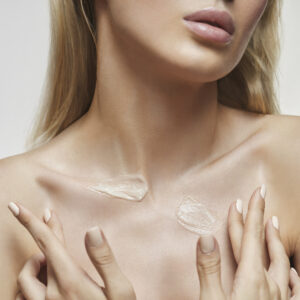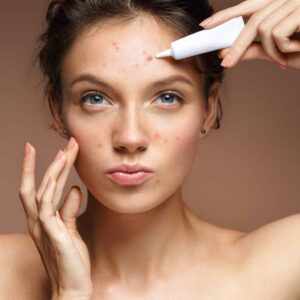In the context of skin care, we hear more and more about the skin microbiome. Indeed, its role is undeniable. Do you know exactly what it is and what functions it performs? The following article will introduce you to the most important information on this topic.
What is the skin microbiome?

The skin microbiome is a group of microorganisms, such as bacteria, viruses, fungi and mites, that live on the surface and in the deeper layers of the skin. These microscopic organisms create an invisible ecosystem that performs key functions for the health and appearance of your skin.
The microbiome performs many important functions, such as:
- Protection against infections: Good bacteria on the skin help fight pathogens that can cause infections or inflammation.
- Maintaining skin pH balance: The skin microbiome works with the hydrolipid barrier to help maintain optimal skin pH, which is crucial for its health.
- Supporting the immune system: Microorganisms on the skin participate in communication with immune system cells, affecting the body’s ability to fight disease.
- Regulation of skin processes: The skin microbiome affects various processes, such as wound healing, sebum production, and skin keratinization.
Skin microbiome face
The facial skin microbiome can be more sensitive to changes due to exposure to external factors. These include, among others: UV radiation, pollution or inappropriate cosmetics. Therefore, taking care of the balance of the facial skin microbiome is important for maintaining a healthy appearance.
How to take care of the skin microbiome?
 Here are some tips on how to take care of the skin microbiome. The tips are especially for the face:
Here are some tips on how to take care of the skin microbiome. The tips are especially for the face:
- Use gentle, fragrance-free products to cleanse your face that do not disturb the skin’s natural pH or disrupt the microbiome.
- Avoid over-washing your face, which can remove beneficial bacteria and weaken the skin’s protective barrier.
- Choose cosmetics that support the skin’s microbiome. Use products that contain probiotics, prebiotics, or postbiotics, which help maintain the balance of the facial skin’s microbiome.
- Avoid using antibiotics when not necessary. They can disrupt the balance of the skin’s microbiome, eliminating both harmful and beneficial bacteria. Only use antibiotics when necessary and only when prescribed by your doctor.
- Take care of your diet. Eating healthy foods rich in fiber, vitamins, minerals, and probiotics (e.g. in yogurt or kefir) can have a positive effect on the skin microbiome.
- Maintain high hygiene levels. At the same time, avoid excessive use of antibacterial agents that can damage the skin microbiome.
By taking care of the skin microbiome, especially the face, you contribute to maintaining the healthy appearance and functioning of your complexion. It is worth paying attention to products and habits that affect the balance of microorganisms to enjoy radiant and healthy skin. It is worth using the advice of a beautician and reaching for natural cosmetics, which do not contain ingredients that have a negative impact on the skin. We invite you to our online store, where you will find innovative products that are based on ingredients from nature.











